|
|
|
Sort Order |
|
|
|
Items / Page
|
|
|
|
|
|
|
| Srl | Item |
| 1 |
ID:
108107
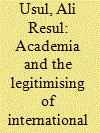

|
|
|
|
|
| Publication |
2011.
|
| Summary/Abstract |
This article aims to highlight the connection between academic studies and international politics and to provide an academic justification of foreign policies with particular reference to the case of democratisation studies. It embodies a two-way relationship. On the one hand, the conjunctures of international politics influence the nature of academic studies in the discipline of Political Science; on the other hand, academic studies may sometimes be employed as sources of legitimisation of the foreign policies of states. The article discusses these connections, providing particular examples of academic studies of the democratisation process during the Cold War and the post-cold war era.
|
|
|
|
|
|
|
|
|
|
|
|
|
|
|
|
| 2 |
ID:
134308


|
|
|
|
|
| Summary/Abstract |
The student-led anti–media-monopoly movement in Taiwan has generated strong momentum since mid-2012. In early 2013, the National Communications Commission responded by drafting the “Prevention of Broadcasting and Television Monopoly and the Maintenance of Diversity Act”, which was approved by the Executive Yuan in April 2013 and is now waiting to be debated in the Legislative Yuan. In contemporary Taiwan, the social is often connected with the political. The existing democratic system, which is a legacy of the democratisation process in the twentieth century, no longer seems adequate to serve the citizens of the twenty-first century. This paper considers the anti-media-monopoly movement and the burgeoning civic movements in recent years as part of a “second wave” of democratisation for further political reform and democratic consolidation. When martial law was lifted in Taiwan in 1987, the “first wave” of media liberalisation ended with the commercialisation of industry. The “second wave” of media democratisation has picked up where the first wave left off and may finally establish, through increasingly more thoughtful media policies, a better and fairer media environment that is more suitable for democratic Taiwan.
|
|
|
|
|
|
|
|
|
|
|
|
|
|
|
|
| 3 |
ID:
118883
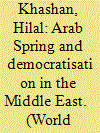

|
|
|
| 4 |
ID:
120782
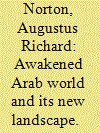

|
|
|
|
|
| Publication |
2013.
|
| Summary/Abstract |
The Arab Awakening augurs the return of political contestation to key Arab societies in which little more than token opposition had been tolerated. Unfolding experiments in democratisation in which Islamically-oriented parties are leading players are underway but the prospects for the consolidation of stable political systems in key counties, such as Egypt or Syria are problematic. These developments have hastened a new regional balance of power in which Saudi Arabia and its allies have sought to stem the tide of change as well as thwart the hegemonial ambitions of Iran. Persistent issues, particularly the Israel-Palestine conflict, remain unresolved and have a powerful grip on the conscience of the Arab world. Key external powers, especially the United States, confront not only stubborn familiar issues but also a host of new strategic, economic, diplomatic and military challenges.
|
|
|
|
|
|
|
|
|
|
|
|
|
|
|
|
| 5 |
ID:
151495
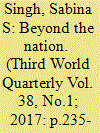

|
|
|
|
|
| Summary/Abstract |
Global frameworks for democratic development today tend to remain within a comparative lens where each country is treated as a sovereign capsule. This portrait eludes the political structures that accompany contemporary globalisation and set the conditions for domestic development. Notably, the comparative perspective eschews the hierarchical nature of states and influential non-state actors that impact democracy movements. Merging international relations theory and comparative politics and using the example of Uganda to illustrate, I create ‘the politics of dispensation.’ Like a doctor dispensing a pill to a patient, Uganda shows how susceptible a country can be to forces beyond democratic control.
|
|
|
|
|
|
|
|
|
|
|
|
|
|
|
|
| 6 |
ID:
103592
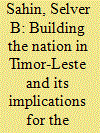

|
|
|
|
|
| Publication |
2011.
|
| Summary/Abstract |
This article contributes to the discussion of the international democratisation of the so-called 'post-conflict' or 'fragile' countries by addressing one of the most important but least studied issues in the literature-the relationship between democracy and nation-building. It does so by analysing the major socio-political aspects of the democratic nation-state-building process in Timor-Leste in the post-1999 period. It argues that contemporary international democratisation policies and practices prioritise the 'stateness' problem, conceptualised by reference to a set of organisational, procedural and functional concerns. Little attention is, however, paid to the 'nationness' question. As the experience in Timor-Leste indicates, it is the national ideas that determine the structural and operational parameters of democratisation, which is, after all, a process of socio-political transformation by which political power and wealth are redistributed amongst a variety of competing societal interests.
|
|
|
|
|
|
|
|
|
|
|
|
|
|
|
|
| 7 |
ID:
103593
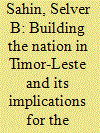

|
|
|
|
|
| Publication |
2011.
|
| Summary/Abstract |
This article contributes to the discussion of the international democratisation of the so-called 'post-conflict' or 'fragile' countries by addressing one of the most important but least studied issues in the literature-the relationship between democracy and nation-building. It does so by analysing the major socio-political aspects of the democratic nation-state-building process in Timor-Leste in the post-1999 period. It argues that contemporary international democratisation policies and practices prioritise the 'stateness' problem, conceptualised by reference to a set of organisational, procedural and functional concerns. Little attention is, however, paid to the 'nationness' question. As the experience in Timor-Leste indicates, it is the national ideas that determine the structural and operational parameters of democratisation, which is, after all, a process of socio-political transformation by which political power and wealth are redistributed amongst a variety of competing societal interests.
|
|
|
|
|
|
|
|
|
|
|
|
|
|
|
|
| 8 |
ID:
148267
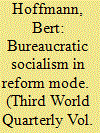

|
|
|
|
|
| Summary/Abstract |
Standard wisdom explains Cuba’s current transformation as one of economic change but political immobility. However, Cuban politics have also undergone a major change since the handing over of power from Fidel to Raúl Castro – even if the rhetoric used has been one of continuity. This article traces this process by looking at four areas: the depersonalisation and re-institutionalisation of the political structures; the diversification of the public sphere, particularly through the use of digital media; the liberalisation of travel and migration, with its transformative impact on state–citizen relations; and the turn to a moderate foreign policy, as highlighted by the rapprochement with the USA, with its implications for legitimising the underpinnings of Cuban socialism. Although the shift has been well below the threshold of a transition to multiparty democracy, Cuba has evolved from the charismatic model of the past to what can be understood as bureaucratic socialism in reform mode.
|
|
|
|
|
|
|
|
|
|
|
|
|
|
|
|
| 9 |
ID:
052757
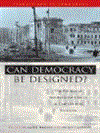

|
|
|
|
|
| Publication |
London, Zed Books, 2003.
|
| Description |
xiv, 336p.
|
| Series |
Democratic transition in conflict torn societies
|
| Standard Number |
1842771515
|
|
|
|
|
|
|
|
|
|
|
|
Copies: C:1/I:0,R:0,Q:0
Circulation
| Accession# | Call# | Current Location | Status | Policy | Location |
| 048360 | 321.8/BAS 048360 | Main | On Shelf | General | |
|
|
|
|
| 10 |
ID:
137929
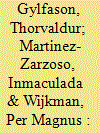

|
|
|
|
|
| Summary/Abstract |
Using a panel gravity model of trade for the period 1995–2010, this paper estimates the potential for increased intra-regional trade among 10 countries of the southern and eastern Mediterranean coast. It examines how closer integration through the EU’s revised neighborhood policy can encourage democratisation and conflict resolution. The main results indicate that while the gains realized to date from regional integration have been small, significant potential gains from deep integration exist. The paper proposes that the EU starts by negotiating deep and comprehensive free trade agreements with Egypt, Israel and Jordan provided these countries also negotiate them with each other.
|
|
|
|
|
|
|
|
|
|
|
|
|
|
|
|
| 11 |
ID:
106221
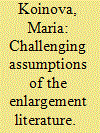

|
|
|
|
|
| Publication |
2011.
|
| Summary/Abstract |
This article argues that from the very start of the transition process in Macedonia, a fusion of concerns about security and democratisation locked local nationalist elites and international organisations intoa political dynamic that prioritised security over democratisation. This dynamic resulted in little progress in the implementation of human and minority rights until 2009, despite heavy EU involvement in Macedonia after the internal warfare of 2001. The effects of this informally institutionalised relationship have been overlooked by scholarship on EU enlargement towards Eastern Europe, which has made generalisations based on assumptions relevant to the democratisation of countries in Eastern Europe, but not the Western Balkans.
|
|
|
|
|
|
|
|
|
|
|
|
|
|
|
|
| 12 |
ID:
120209
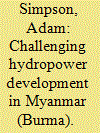

|
|
|
|
|
| Publication |
2013.
|
| Summary/Abstract |
Although general elections in Myanmar (Burma) in November 2010 have transformed the political landscape, many of the characters remain the same. While there is evidence of incremental domestic political openings many of the political constraints that existed during military rule remain in force. As a consequence of decades of military authoritarian governance and civil conflict, it is Myanmar's contested ethnic borderlands that have been the important locales for the development of environmental movements, despite increased recent domestic activity. This article analyses a case study of the largely cross-border campaign against hydropower dams on the Salween River in Myanmar and finds that through the suppression of opposition and dissent at home the regime has stimulated the creation of an 'activist diaspora', a dynamic transnational community of expatriates who engage in environmental activism beyond the reach of the regime. Due to their relative freedom on the border and in Thailand this community has developed expertise and international networks that have proved crucial in communicating the social and environmental impacts of hydropower development in Myanmar to the international community. Through increased cooperation with an expanding domestic civil society this established activist community is stimulating improved environmental governance of hydropower development and simultaneously assisting in the creation of a more open and democratic Myanmar.
|
|
|
|
|
|
|
|
|
|
|
|
|
|
|
|
| 13 |
ID:
106092
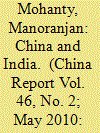

|
|
|
| 14 |
ID:
124665
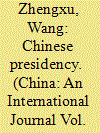

|
|
|
|
|
| Publication |
2013.
|
| Summary/Abstract |
The role of the Chinese presidency includes several important powers such as serving as the paramount leader of the Party, controlling the military, foreign affairs and national security portfolios of state power. With these configurations, a Chinese presidency has taken a preliminary shape - today China can be characterised as a one-Party presidential system. But ambiguities loom extraordinarily large, as the defining lines between Party powers and state powers are still undrawn and the constitutional bases of the presidency are almost entirely missing. Future developments, however, may offer breakthroughs in these areas.
|
|
|
|
|
|
|
|
|
|
|
|
|
|
|
|
| 15 |
ID:
072279
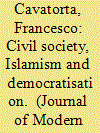

|
|
|
|
|
| Publication |
2006.
|
| Summary/Abstract |
The positive role that an active civil society plays in processes of democratisation is often highlighted in the literature. However, when it comes to the Middle East and North Africa, such activism is considered to be detrimental to democratisation because the predominant role is played by Islamist groups. The explanation for this rests with the perceived 'uncivil' and undemocratic Islamist ethos of such groups. This paper challenges this assumption and argues that Islamist associations can be a potential force for democratisation for three reasons. First, they are capable of political learning; secondly, they generate secular civil society activism as a response to their activities, increasing the number of actors in the political and social system; and finally, they can cooperate with other civil society groups on a number of issues, given that they are all subject to the same authoritarian constraints. The paper focuses in particular on the case of Morocco and the Islamist group Jamiat al-Adl wal-Ihsan.
|
|
|
|
|
|
|
|
|
|
|
|
|
|
|
|
| 16 |
ID:
138452
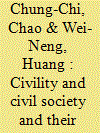

|
|
|
|
|
| Summary/Abstract |
This article examines the development of civil society and its relationship to democratisation in Taiwan. Civil society, through collective activities organised by civil groups, has been presumed to play a critical role in protecting citizens from the state’s overextended interference in people’s lives, which in turn safeguards their civil rights. This article proposes, however, that in Taiwan’s case, before citizens were allowed to organise civil associations, some intellectuals had already devoted themselves to the pursuit of democracy through their individual activities. Such activities transformed a political constraint into an opportunity structure, allowing civil society and democratisation to develop.
|
|
|
|
|
|
|
|
|
|
|
|
|
|
|
|
| 17 |
ID:
112796
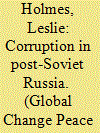

|
|
|
|
|
| Publication |
2012.
|
| Summary/Abstract |
Corruption has been a serious problem in post-Soviet Russia - though there was also much more of it in Soviet Russia than is generally realised. This article considers the scale of the problem, its causes and what both the authorities and civil society are doing about it. It argues that President Medvedev has been genuine in wanting to reduce corruption, and much more committed to this than either of his predecessors were. But corruption is so widespread and pervasive in Russia that it will take many years to bring it down to 'reasonable' levels; Medvedev's political will is a necessary but insufficient condition, and he requires greater political capacity and support. Moreover, since Putin has been elected to become president again (March 2012), the anti-corruption momentum built up by Medvedev will dissipate, unless Medvedev is made prime minister and given both full support and free rein by the president to pursue his anti-corruption drive.
|
|
|
|
|
|
|
|
|
|
|
|
|
|
|
|
| 18 |
ID:
082557
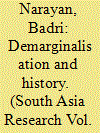

|
|
|
|
|
| Publication |
2008.
|
| Summary/Abstract |
The article demonstrates how the ongoing demarginalisation of Dalits in India today works on a variety of levels. Through creating new narratives and virtually inventing a new alternative history and language, this movement for demarginalisation uses a particular style of popular and widely circulated booklets, vigorously read and disseminated by the neo-literate Dalit population. The construction of this alternative history through such new texts, seen as an existential necessity for the Dalits, works by weaving together stories found in religious Brahminical popular texts about dissenting lower caste characters, glorified as Dalit heroes who fought against upper caste oppression and injustice. It also includes stories of unsung Dalit freedom fighters, transformed into local myths. Importantly, the language used is different from Standard Hindi, since folk proverbs, idioms and symbols, as well as the grammar and vocabulary of local dialects, are used. The article demonstrates in some detail how these processes of constructing new literature work, and indicates that these new sources may well be laying foundations for the histories of the future of many subaltern communities of South Asia
|
|
|
|
|
|
|
|
|
|
|
|
|
|
|
|
| 19 |
ID:
058953
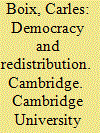

|
|
|
|
|
| Publication |
Cambridge, Cambridge University Press, 2003.
|
| Description |
xiii, 264p.
|
| Series |
Cambridge studies in comparative politics
|
| Standard Number |
0521532671
|
|
|
|
|
|
|
|
|
|
|
|
Copies: C:1/I:0,R:0,Q:0
Circulation
| Accession# | Call# | Current Location | Status | Policy | Location |
| 049190 | 320.6/BOI 049190 | Main | On Shelf | General | |
|
|
|
|
| 20 |
ID:
118870
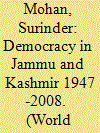

|
|
|
|
|
|
|
|